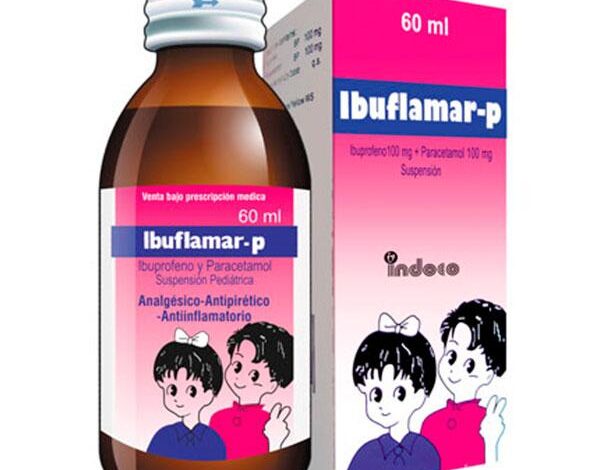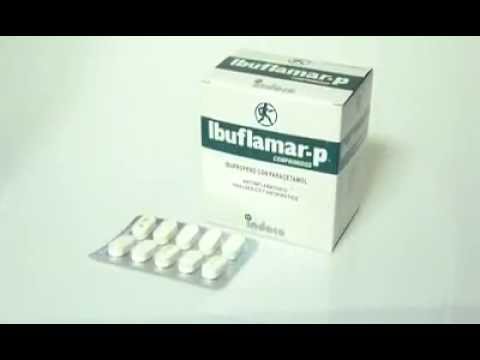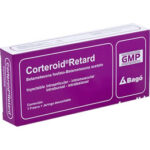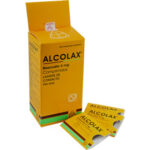Ibuflamar P: Uses, Side Effects, Interaction, Warnings

Ibuflamar P is a combination pain medication that contains Ibuprofen (400mg) + Paracetamol (325mg). They work together to reduce pain, fever, and inflammation.
Ibuflamar P is used to treat many conditions such as headache, muscle pain, pain during periods, toothache and joint pain. Combined paracetamol and ibuprofen has been shown to be more effective than either constituent alone for acute pain. This medication comes as a tablet and a suspension for children.

How Ibuflamar P works
Paracetamol works to stop the pain messages from getting through to the brain. Paracetamol also acts in the brain to reduce fever. Ibuprofen belongs to a family of medicines called non-steroidal anti-inflammatory drugs (NSAIDS). This group of medicines work by relieving pain, inflammation (swelling, redness, soreness) and fever.
Who should not take Ibuflamar P?
You should not take IBUFLAMAR P tablets if you are allergic to:
- Paracetamol
- Ibuprofen
- Aspirin
Other NSAIDs or any of the ingredients listed under “Product Description”.
The symptoms of an allergic reaction may include:
- Shortness of breath
- Wheezing or difficulty breathing
- Swelling of the face, lips, tongue or other parts of the body
- Rash, itching or hives on the skin
- Stomach ache, fever, chills, nausea and vomiting, fainting
If you are allergic to aspirin or NSAIDs medicines and take IBUFLAMAR P tablets, these symptoms may be severe.
Do not take IBUFLAMAR P tablets if you are also taking any other medicines that contain one or more NSAID medicine, whether prescribed by your doctor or obtained without prescription.
Several medicines used to treat headache, period pain and other aches and pains contain aspirin or NSAIDs. If you are not sure if the medicines you are taking contain these ingredients, ask your pharmacist.
Do not take this medicine if you are pregnant or plan to become pregnant.
Ibuprofen should not be taken at all during the last 3 months of pregnancy including the last few days before expected birth.
Unless advised by a medical doctor, do not take Ibuprofen during the first 6 months of pregnancy.
Do not take this medicine if you have any of the following conditions:
- Asthma, bronchitis, emphysema or other acute breathing difficulties
- Bleeding from the rectum (back passage), have black sticky bowel motions (stools) or bloody diarrhoea
- If you have a stomach ulcer
- Recent vomiting of blood or material that look like coffee grounds
- Liver or kidney disease
- Heart problems
Do not take this medicine if you regularly drink large quantities of alcohol.
Ask your doctor or pharmacist about taking IBUFLAMAR P tablets if you are breastfeeding.
Do not use IBUFLAMAR P tablets in children under 12 years.
Ask your doctor or pharmacist about taking IBUFLAMAR P tablets if you are over 65 years of age and have kidney or respiratory problems.
Do not use it after the expiry date (EXP) printed on the pack. If you take it after the expiry date it may have no effect at all, or worse, have an entirely unexpected effect.
Do not use IBUFLAMAR P tablets if the packaging is torn or shows signs of tampering.
Before you start to take it
Do not take IBUFLAMAR P tablets with other medicines containing paracetamol or ibuprofen, aspirin, salicylates or with any other anti-inflammatory medicines, unless advised to do so by a doctor or pharmacist.
You must tell your pharmacist or doctor if:
- You have allergies to any ingredients listed under “Product Description” at the end of this leaflet.
- You have any ever had of these conditions:
- Liver, kidney or heart problems
- Asthma, or have suffered in the past from asthma.
- You drink large quantities of alcohol
- You have a history or drug or alcohol abuse
- Recent surgery on the stomach or intestines
- Previous history of ulcers
- If you currently have any of these conditions you should not take this medicine.
Ask your pharmacist about taking this medicine if you are breastfeeding. Small amounts of ibuprofen and paracetamol pass into the breast milk.
Taking other medicines
Tell your pharmacist or doctor if you are using any other medicines including any of the following medicines:
- Aspirin, salicylates or other NSAID medicines.
- Warfarin or other medicines used to stop blood clots or thin the blood.
- Zidovudine a medicine used to treat HIV infection.
- Lithium and other medicines used to treat depression or anxiety e.g. MAOIs (even if taken within the last 14 days).
- Medicines to treat epilepsy
- Metoclopramide, a medicine used to control nausea and vomiting
- Propantheline, a drug used to treat stomach ulcers
- Chloramphenicol, an antibiotic used to treat ear and eye infections
- Medicines used to relieve stomach cramps or spasms
- Medicines such as prednisone, prednisolone and cortisone, which reduce the activity of your immune system
- Probenecid, as drug used to treat high uric acid levels in blood associated with gout
- Colestyramine, as drug used to reduce blood cholesterol
- Methotrexate, a medicine used to treat arthritis and some types of cancer
- Diuretics, also called fluid tablets
- Medicines used to treat high blood pressure or other heart conditions
These medicines may be affected by IBUFLAMAR P tablets or affect how well IBUFLAMAR P tablets work.
Your doctor or pharmacist can tell you what to do if you are taking any of these medicines.
You should also tell your pharmacist or doctor about any other medicines that you have bought without a prescription from either your pharmacy, supermarket or health food shop.
If you have not told your pharmacist or doctor about any of these things, tell him/her before you take any IBUFLAMAR P tablets.
How to take IBUFLAMAR P tablets
The label on your pack IBUFLAMAR P tablets will tell you how to take your medicine and how often. If you are unsure about the directions, ask your doctor or pharmacist.
How long to take it
Adults: Do not take this medicine for longer than 3 days at a time unless advised to by a doctor.
Adolescents 12 – 17 years: Do not take this medicine for longer than 2 days at a time, unless advised to by a doctor.
Do not take more than 3 tablets in a 24 hour period.
Keep to the recommended dose. If IBUFLAMAR P tablets are not adequately controlling your pain, do not increase the dose. Please see your doctor.
Do not give this medicine to children under 12 years of age.
As with other NSAIDs, excessive or prolonged use of ibuprofen may increase the risk of heart attack, stroke or liver damage.
If your symptoms persist, worsen or new symptoms develop, talk to your doctor or pharmacist.
If you take too much (Overdose)
Immediately telephone your doctor or Poisons Information Centre or go to Accident and Emergency at your nearest hospital, if you think that you or anyone else may have taken too much IBUFLAMAR P tablets.
Do this even if there are no signs of discomfort or poisoning. You may need urgent medical attention because of the risk of delayed, serious liver damage with an overdose of paracetamol.
If you take too many tablets you may feel nauseous or have upset stomach, experience vomiting and gastric irritation, feel light headed, dizzy or drowsy. Excitability, convulsions and unconsciousness may be experienced in rare cases.
While you are taking IBUFLAMAR P tablets
Things you must do
Things you must NOT do
- Take IBUFLAMAR P tablets exactly as your pharmacist or doctor has told you to.
- Tell all your doctors, dentists and pharmacists that you are taking IBUFLAMAR P tablets.
- Tell your doctor or pharmacist if you become pregnant while taking IBUFLAMAR P tablets.
Do not use this medicine to treat any other complaint unless your doctor or pharmacist says it is safe. Do not give this medicine to anyone else even if they have the same symptoms as you.
Adults: Do not take this medicine for longer than 3 days at a time unless advised to by a doctor.
Adolescents 12 – 17 years: Do not take this medicine for longer than 2 days at a time, unless advised to by a doctor.
- Do not give this medicine to children under 12 years of age.
- Do not take more than the recommended dose unless your doctor tells you to.
- Do not take this medicine if you are taking other medicines that contain aspirin, paracetamol, ibuprofen, salicylates or other anti-inflammatory medicines or other medicines for pain relief.
Things to be careful of
IBUFLAMAR P tablets may cause dizziness or drowsiness in some people, especially after the first dose.
If affected, do not drive a car, operate machinery or do anything else that could be dangerous if you are dizzy or drowsy. Children should not ride bikes if affected and should be supervised to avoid potential harm.
Avoid drinking alcohol. Drinking large quantities of alcohol while taking paracetamol may increase the risk of liver side effects.
Side Effects
Tell your doctor or pharmacist as soon as possible if you do not feel well while taking IBUFLAMAR P tablets.
Like other medicines, IBUFLAMAR P tablets can cause some side effects. If they occur, they are most likely minor and temporary. However, sometimes they are serious and need medical treatment.
Ask your doctor or pharmacist to answer any questions you may have.
Tell your pharmacist or doctor if you notice any of the following and they worry you:
- Nausea
- Vomiting
- Stomach pain
- Diarrhoea
- Heartburn, indigestion
- Dizziness
- Light-headedness
- Drowsiness
Be careful driving or operating machinery until you know how IBUFLAMAR P tablets affect you.
The above list includes the more common side effects of your medicine. They are usually mild.
Tell your doctor as soon as possible if you notice any of the following:
- Skin rashes
- Yellowing of the skin and eyes also called jaundice
- Painful red areas with blisters and peeling layers of skin which may be accompanied by fever and/or chills
- Flushing of the face
- Fast heartbeat.
The above list includes serious side effects that may require medical attention. Serious side effects are rare for low doses of this medicine and when used for a short period of time.
If any of the following happen, stop taking IBUFLAMAR P tablets and tell your pharmacist or doctor immediately or go to Accident and Emergency at your nearest hospital:
- Vomiting blood or material that looks like coffee grounds.
- Bleeding from the back passage, black sticky bowel motions (stools) or bloody diarrhoea.
- Swelling of the face, lips or tongue which may cause difficulty in swallowing or breathing.
- Swelling of other parts of the body
- Asthma, wheezing, shortness of breath, pain or tightness in the chest
- Sudden or severe itching, skin rash, hives, skin peeling
The above list includes very serious side effects. You may need urgent medical attention or hospitalization.
If you believe IBUFLAMAR P tablets are not working well for you, do not increase the dose. Please see your pharmacist or doctor.
Some people may get other side effects not listed above.
Tell your pharmacist or doctor you notice anything else that making you feel unwell.
Storage & Disposal
If your pharmacist or doctor tells you to stop taking the tablets, ask your pharmacist what to do with any tablets that are left over.
- Keep your tablets in the blister pack until it is time to take them.
- Keep IBUFLAMAR P tablets in a cool dry place where the temperature stays below 25°C.
- Heat and dampness can destroy some medicines.
- Do not leave IBUFLAMAR P tablets in the car on hot days.
- Do not store IBUFLAMAR P tablets or any other medicine in the bathroom or near a sink.
- Keep IBUFLAMAR P tablets where young children cannot reach it.
- A locked cupboard at least one and a half meters above the ground is a good place to store medicines.
This is not all the information that is available on IBUFLAMAR P tablets. If you have any more questions or are not sure about anything, ask your doctor or pharmacist.





